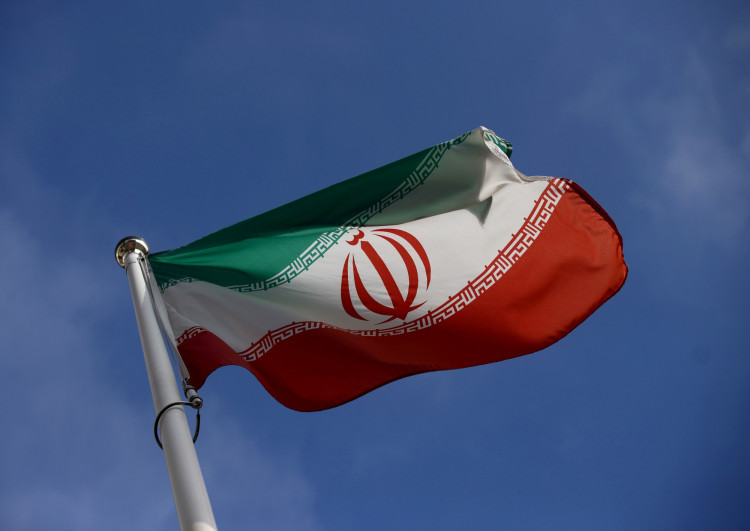On December 24, local time, Iran showcased seven new types of military equipment at a naval base in the Indian Ocean, including three missiles, two helicopters, and two drones. Among these, the intelligent missile system Talaeyeh has a range of over 1000 kilometers and can change targets during its mission. Another missile that garnered attention is the Nasir, with a range of 100 kilometers, a sea-launched cruise missile.
The Iranian Navy stated that with these new additions, it could strike military bases in the region where U.S. and Israeli forces are located.
Additionally, the Iranian Navy showcased its electronic warfare and reconnaissance systems through helicopters and drones. The former was demonstrated with signal jammers and counter-electronic attack equipment.
In electronic warfare, combat units typically use signal interference to weaken the enemy's communication capabilities and intelligence systems, as well as reduce the accuracy of enemy missiles and combat systems. Therefore, enhancing electronic warfare capabilities is crucial for combat units.
Regarding the reconnaissance systems, the Iranian Navy did not specify whether they would be used for maritime or land combat.
This display of new weapons came just a day after tensions between Iran and the U.S. escalated further due to an attack on an oil tanker in the Indian Ocean. Over the weekend, the CHEM PLUTO, a chemical tanker sailing in the Indian Ocean, was hit by a drone. The U.S. Department of Defense attributed the drone to Iran. This marks the first time since the escalation of the Israeli-Palestinian conflict on October 7 that the U.S. has publicly accused Iran of directly attacking civilian ships. Iranian Foreign Minister Hossein Amir-Abdollahian denied the allegations.
The CHEM PLUTO, owned by Japan's Rio Brillante and operated by the Netherlands' Ace-Quantum Chemical Tankers, was flying the Liberian flag when attacked. The Wall Street Journal reported that Israeli billionaire Idan Ofer has connections with the Dutch company managing the CHEM PLUTO.
In fact, this isn't the first time a ship connected to Ofer has been attacked in the Indian Ocean. On the morning of November 24, the Symi, a container ship owned by Singapore's Eastern Pacific Shipping, was attacked. At the time, a U.S. defense official revealed that the drone was suspected to belong to the Iranian Islamic Revolutionary Guard Corps.
Additionally, the U.S. and Iran continue to dispute Iran's involvement in Houthi armed attacks in the Red Sea. Over the past month, the Houthis have launched over 100 attacks on more than a dozen merchant ships passing through the Red Sea, involving 35 countries.
Over the weekend, the U.S. government accused Iran of participating in the Houthi attacks in the Red Sea, severely impacting global shipping. Amir-Abdollahian denied the accusations, stating that the U.S. charges are baseless and that the Houthis' actions were a decision made in support of the Palestinian side.
On December 18, during a visit to Israel, U.S. Defense Secretary Lloyd Austin warned Iran to immediately cease its support for the Houthis. On the same day, Austin announced the launch of a joint escort operation called "Operation Prosperous Guardian" to ensure the safety of maritime traffic in the Red Sea, the Strait of Mandeb, and the Gulf of Aden, with over 20 countries participating.
In response to the U.S. initiative, Iran formed the Basij naval force on December 21. This force will operate in the Arabian Sea waters to the Tanzanian coast of East Africa, aiming to protect the security of Iran's offshore oil and gas facilities. The force consists of 55,000 soldiers and 33,000 naval vessels, equipped with AI-guided long-range missiles.
Over the weekend, Amir-Abdollahian stated at a press conference in Iran that the U.S.-initiated joint escort operation would not help improve the situation in Gaza and could potentially widen the conflict. Instead of establishing a futile escort alliance, the U.S. should stop supporting Israel and demand that Israel cease its military operations in Gaza.
Since the escalation of the Israeli-Palestinian conflict, Iran has repeatedly condemned Israel's military activities in the Gaza Strip. Islamic Revolutionary Guard Corps commander Mohammad Reza Naqdi warned over the weekend that if the U.S. continues to condone Israeli attacks on Gaza, Iran will block the Mediterranean, the Strait of Gibraltar, and other waterways.
If the Strait of Gibraltar and the Mediterranean are affected, some European countries will have to resort to land and sea transportation to communicate with the outside world, significantly increasing transportation costs.
However, Iran itself does not have direct access to the Mediterranean, and the only organizations in the Mediterranean region supported by Iran are Hezbollah in Lebanon and Syrian militias. Both countries are located on the eastern coast of the Mediterranean. It's still unclear how Iran intends to block the Mediterranean.
According to Al Jazeera, Iran has also publicly unveiled a large number of military equipment in the past two months, including the "Fatah-2" hypersonic missile, the "Karar" drone equipped with Majid heat-seeking missiles, two upgraded 9D anti-missile systems, new T-72 tanks, and Shahed-147 drones.
In recent years, Iran has developed various missiles and drones by retrofitting weapons seized from Western countries. Iranian military enterprises are skilled at retrofitting weapons.
Iranian political researcher Mostafa Bor stated that Iran's recent display of military strength is closely linked to the ongoing escalation of the Israeli-Palestinian conflict. He believes Iran's actions are intended to show support for allies and provide assistance to Palestine alongside friendly organizations and countries, as well as to warn Israel and its allies to cease attacks on the Gaza Strip.




